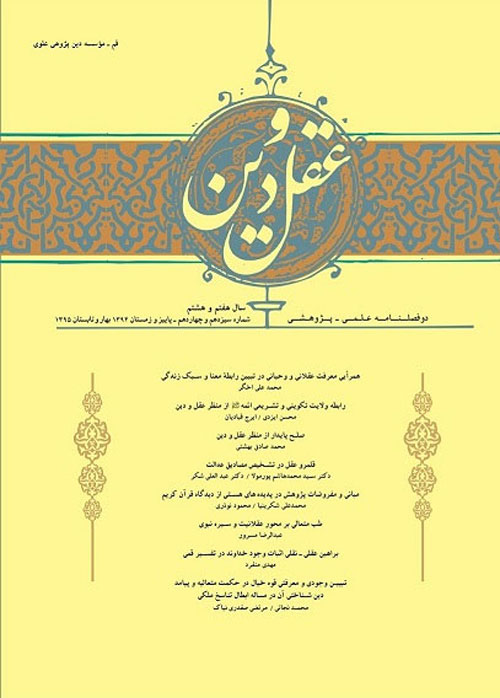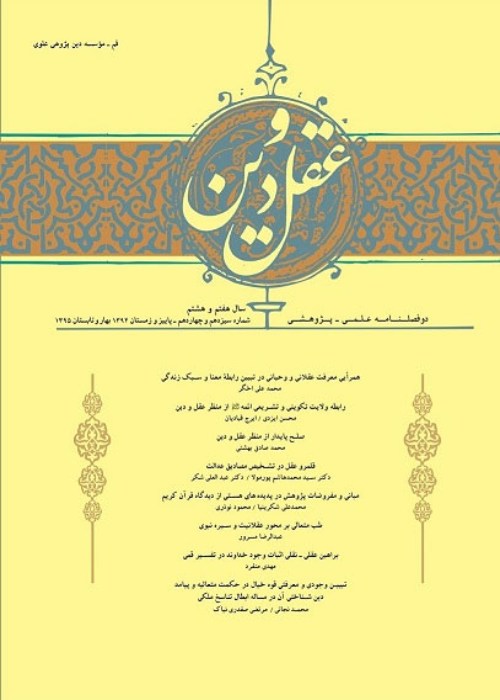فهرست مطالب

نشریه عقل و دین
پیاپی 8 (بهار و تابستان 1392)
- تاریخ انتشار: 1392/06/25
- تعداد عناوین: 6
-
-
صفحه 7
-
صفحه 27
-
صفحه 103
-
Page 7Undoubtedly, the final prophet is the best person and lord of all the prophets and apostles. If anybody has attained such position after him or not, and if he has attained, who is he? Mamoon al-Rashid-e Abbasi established a debate gathering consists of some the Kâlam authorities and the narrators and he conversed with them. They have recognized Abubakr as the best human and Mâmoon did Imam Ali (A). This writing, has criticed and studied a part of that long debate, that it is on the base of the verse of the cave, and it also believes Mâmoons reasoning that it is decisive and has added some comments to it.Keywords: The best human, Mamoon al Rashid, The narrators, The Kâlam authorities, Imam Ali, Abubakr
-
Page 27The sophisticated issues on theism, due to God's glory, have made the Muslim philosophers confess the weakness of intellect and rationality. These scholars, particularly from the time of Mollasadra untill now, are greatly indebted to Imam Ali for his exalted words and sayings in Nahj-al- Balaghe concerning theism. Among the theistical issues enlightened in Nahjal- Balaghe are: the levels of pure monotheism, the possibility of knowing God, the levels of the human's knowledge of God, the manner of scribing God to perfection attributes, God's way of talking, God's fate and destiny, etc. It seems that the divine and intellectual sage's efforts together with taking advantage of Imam Ali's ideas and beliefs within the framework of hermeneutics have led to many logically plausible findings. These findings have been in line with the Qurnic verses and the Islamic mystic's views.Keywords: Nahj, al, Balaghe, Intellectual Theism, Monotheism, Attributes of God
-
Page 47Question on God is one of the most important problems of philosophical and theological systems. This writing with choosing Hume and Leibniz from two systems of realism and empiricism studies and compares their views about God. Maybe can be said Hume and Leibniz contrary seriously in the problem, because Hume on the basis of his empirical system refuses the same arguments that Leibniz has used them in the proving of the being of God. The philosophy of Leibniz is a theocentric philosophical system whereas in the Humes philosophical system that knowledge is on the basis of sense and experience, faith in God that it is a metempirical topic- has not a place.Keywords: God, Believe, Argument, Hume, Leibniz
-
Page 67This research, which is an applied research, has been carried out for examining methods of intellectual education on the basis of Imam Rezas statements. The method of this research is descriptive analytic, the method of information gathering is documental, the method of analyzing information is content analysis, and it has been tried to respond to this question: What are the methods of intellectual education on the basis of Imam Rezas statements? Finally, these findings have been obtained: on the basis of Imam Rezas statements the methods of intellectual education are dividing to two groups: the methods of educating theoretical reason and the methods of educating practical reason. The methods of educating theoretical reason are: thinking, knowledge learning, and experience obtaining. These methods are used to the first aim of intellectual education, namely knowledge. The methods of educating practical reason are purification of the soul. This method is used to actualizing the second and third aims of intellectual education, namely faith and action. The steps of soul purification are: neglect cleaning, penitence, asceticism, attention and accounting, and virtue.Keywords: Imam Reza, Intellectual education, Methods of intellectual education
-
Page 103For explaining the genesis of the universe, philosophers has long been believed that from a real simple thing does not appear, just one thing emerges. Because the emanation of a multitude from simple subject, it will require a multitude of modes and combinations in nature of the subject. This is what is incompatible with the unity and simplicity of the universe Creator. This is one of the main reasons of philosophers to prove the Al-Vahed Axiom. Some theologians such as Ghazali and Razy, believe that this rule limits the power of God. This could be a blasphemy to God. Because the other arguments prove that the power of God is infinite and absolute. So, they have tried to undermine the arguments of philosophers. But philosophers believe that this argument is not incompatible with God's omnipotence. It is based on the principle of causality and the rule of cognation between cause and effect, all beings - mediated or unmediated- are created by God. Due to issues such as absolute poverty of existence andindivisible entity and ascertainment the first real emanation, this incompatibility can be resolved.Keywords: Al, Vahed Axiom, first emanation, indivisible entity, copulative existence, unfolded existence
-
Page 119The holy ghost is one of debates considered as inter-religion in fluential and koran's discussions and according to intra-religion aspect it's comparative. In this study, we try to analyze it from two views. Most of commentators, point o view is that Rouh- Al-Ghodos is Gabriel and in fact it's from Angel's kind. Philosophical aspect Knows Rouh- Al-Ghodos the same as Gabriel and equal them in active intellect. Narrations point of view knows the holy ghost separated and more bigger than other creations. In Christianity, the holy ghost is one of the triple letters who has divine traits. By criticizing and studying all these aspects, we conclude that Rouh- Al- Ghodos isnt Gabriel and it's apart from philosophical active intellect and of course it doesnt have divine traits. He's nothing except a creation that his job is to knowledge emanate and setting a right to prophets. It has some partswhich is one holy ghost common between prophets and saints and the other one is just for Islam prophet and Aeme (peace be upon them).Keywords: The holy ghost, Gabriel, Active intellect


